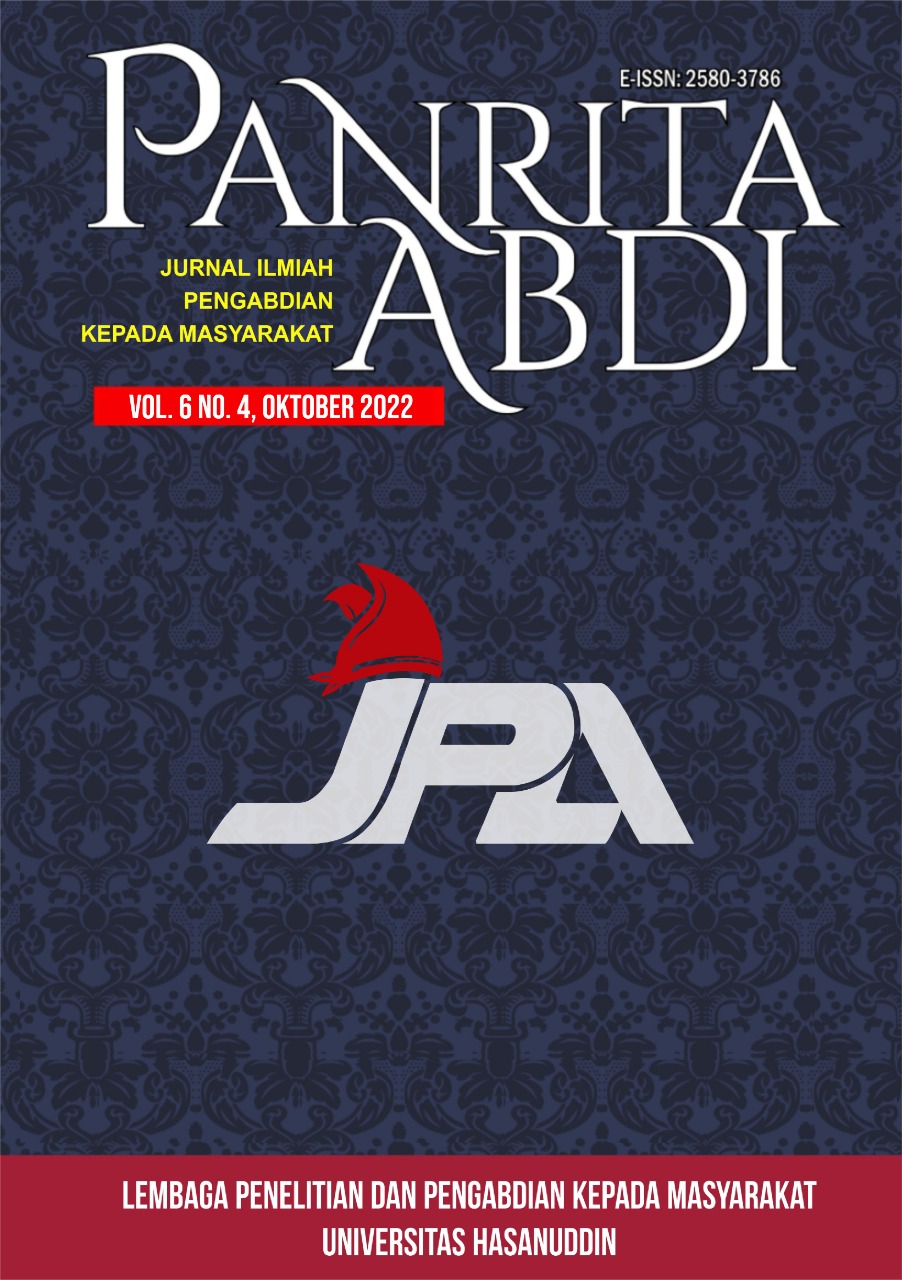PENINGKATAN POTENSI SUMBERDAYA DAERAH MELALUI INKLUSIF GENDER DI KELURAHAN BORI APPAKA KECAMATAN BUNGORO KABUPATEN PANGKEP
DOI:
https://doi.org/10.20956/pa.v6i4.18086Keywords:
Regional resources, gender inclusive, gender-responsive budget (ARG)Abstract
The issue of gender equality is an issue that is still often misunderstood as a term that refers only to women and is specific to a particular individual and cultural issues. Gender discrimination can create differences between men and women in accessing and obtaining development benefits. The Government of Indonesia reveals the number of genders as one of the development problems so that it explicitly includes gender as an element in poverty alleviation and ensures commitment to work towards gender by increasing gender-responsive national-level programs and regulations. Pangkep Regency is one of the regions in South Sulawesi that has realized a fairly large gender responsive budget (ARG) in several human resource capacity-building programs. This is an opportunity for the community to take advantage of the potential of the region's superior potential. One of them is through the results of ponds that can be managed into processed products that are innovative and have high selling value so that they can encourage the regional economy. The methods in this service activity are socialization, presentation, and hands-on/tutorial practice. The results of this community empowerment activity were successfully carried out until the processing of pond products became more innovative. Participants have understood the legal framework and government policies for equalizing opportunities in the gender-inclusive economic sector and can take advantage of regional potential for products worthy of sale. --- Persoalan penyetaraan gender menjadi isu yang masih sering disalahartikan sebagai istilah yang merujuk pada perempuan saja dan sifatnya spesifik terhadap persoalan individu serta budaya tertentu. Diskriminasi gender dapat menimbulkan perbedaan antara laki-laki dan perempuan dalam mengakses dan memperoleh manfaat pembangunan. Pemerintah Indonesia mengakui kesetaraan gender sebagai salah satu permasalahan pembangunan sehingga secara eksplisit memasukkan gender sebagai elemen dalam pengentasan kemiskinan dan memastikan adanya komitmen untuk mengupayakan kesetaraan gender dengan meningkatkan jumlah program, peraturan dan anggaran tingkat nasional yang responsif gender. Kabupaten Pangkep merupakan salah satu daerah di Sulawesi Selatan yang merealisasikan anggaran responsif gender (ARG) dalam jumlah yang cukup besar pada beberapa program peningkatan kapasitas sumberdaya manusia. Hal tersebut menjadi peluang bagi masyarakat untuk memanfaatkan potensi sumberdaya unggulan daerah yang potensial. Salah satunya melalui hasil tambak yang dapat dikelola menjadi produk olahan yang inovatif dan bernilai jual tinggi sehingga dapat mendorong perekonomian daerah. Metode dalam kegiatan pengabdian ini adalah sosialisasi, presentasi, dan praktek langsung/tutorial. Hasil kegiatan pemberdayaan masyarakat ini berhasil dilaksanakan sampai dengan pengolahan hasil tambak menjadi lebih inovatif. Peserta telah memahami kerangka hukum dan kebijakan pemerintah bagi penyetaraan peluang sektor ekonomi yang inklusif gender serta mampu memanfaatkan potensi daerah menjadi produk yang bernilai jual.Downloads
References
Ayu, P. C. (2020). Community Service Activity to Housewife Group in Kampung Ladang Bambu, Medan Tuntungan. Journal of Saintech Transfer, 3(2).
Breda, T., Jouini, E., Napp, C., & Thebault, G. (2020). Gender stereotypes can explain the gender-equality paradox. Proceedings of the National Academy of Sciences of the United States of America, 117(49).
Fors Connolly, F., Goossen, M., & Hjerm, M. (2020). Does Gender Equality Cause Gender Differences in Values? Reassessing the Gender-Equality-Personality Paradox. Sex Roles, 83(1–2).
Hidayat, M., Latief, F., Hidayah, N., & Asbara, N. W. (2021). MATAPPA : Jurnal Pengabdian Kepada Masyarakat Revitalisasi BUMDesa Melalui Penyygelolaan Potensi Lokal untuk Mewujudkan BUMDesa Yang Sehat dan Mandiri. 4, 447–456.
Iswandi, S., Yunus, R., & Agussalim. (2020). The implementation of law number 6 the year 2014 concerning with villages in gender-responsive development planning in Uluere District, Bantaeng Regency. IOP Conference Series: Earth and Environmental Science, 473(1).
Kudsiah, H., Rahim, S.W., Rifa’i, M.A., & Arwan. (2018). Demplot Pengembangan Budidaya Kepiting Cangkang Lunak di Desa Salemba, Kecamatan Ujung Loi, Kabupaten Bulukumba Sulawesi Selatan. Jurnal Panrita Abdi, 2(2), 151-164.
Loan, L. T., Duong Cong, D., Thang, H. N., Nga, N. T. V., Van, P. T., & Hoa, P. T. (2021). Entrepreneurial behaviour: The effects of the fear and anxiety of covid-19 and business opportunity recognition. Entrepreneurial Business and Economics Review, 9(3).
Najihah, N., Adiwijaya, Z. A., & Mutoharoh, M. (2021). Optimalisasi Ibu Rumah Tangga dalam Peningkatan Ekonomi Keluarga melalui Pelatihan Teknik Shibori. Abdimas: Jurnal Pengabdian Masyarakat Universitas Merdeka Malang, 6(3).
Ozonas Marcos, M. (2020). How to integrate a gender perspective into well-being budgeting practices: Insights from a comparative case study between Bhutan and New Zealand. In Feminismo/s (Issue 35).
Setiawati, E., & Rozinah, S. (2020). Pemberdayaan Ibu-Ibu Rumah Tangga Dalam Upaya Meningkatkan Ekonomi Keluarga Melalui Pengelolaan Usaha Rumahan di Tangerang Selatan. Aksiologiya: Jurnal Pengabdian Kepada Masyarakat, 4(2), 231–240.
Suharyono, & Digdowiseiso, K. (2021). Education and gender wage gap: Evidence from indonesia. Accounting, 7(1), 33–40.
http://siga.dpppa.pangkepkab.go.id/page-data-data_dasar.html
Downloads
Published
How to Cite
Issue
Section
License
Copyright (c) 2022 Andi Ririn Oktaviani, Andi Widiawati, Andi Marlinah, Nurhaeda Zaeni

This work is licensed under a Creative Commons Attribution-NonCommercial-NoDerivatives 4.0 International License.



















